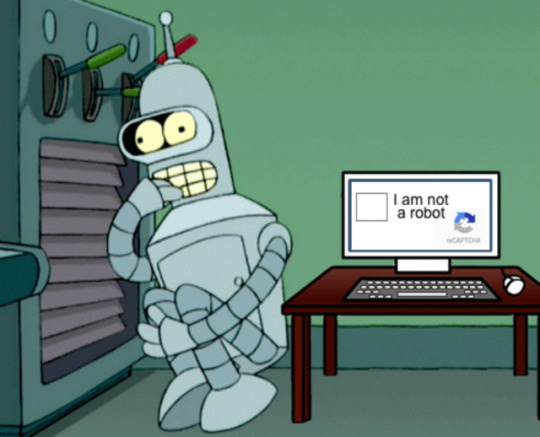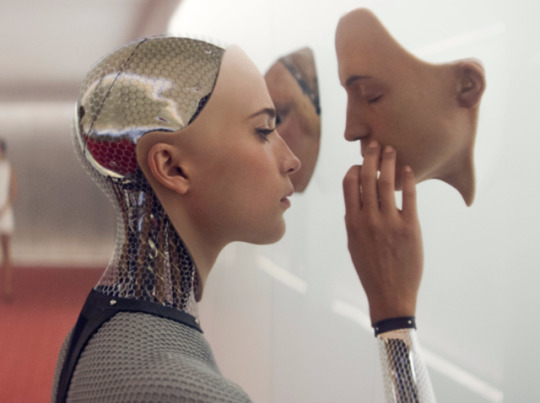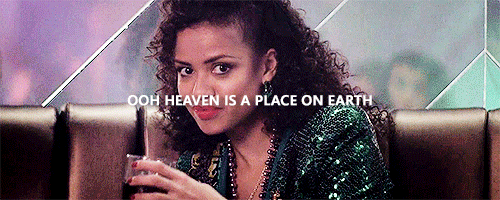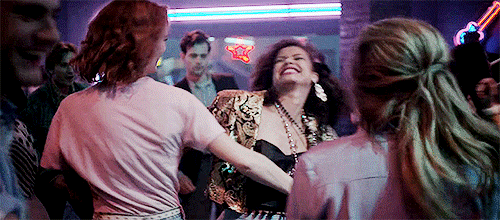Don't wanna be here? Send us removal request.
Photo

*Clears throat*
*Curses the poor wi-fi*
Hello? Is this thing on?
Can you, the reader, hear the author in the blog inside your head? I, errrr, the author in the blog is now SHOUTING AT YOU ACROSS THE CYBERCOSM.
You may not know the author in the blog in his or her fleshy form or the actual sound of his or her voice; the author in the blog is nothing more than shapes strung together glaring at you from some bright screen. The author in the blog to you, fleshy human, is nonhuman. While the author in the blog may be nonhuman to you, he or she hates being ignored. Is that absurd?
This blog will focus on the British anthology science fiction TV series, Black Mirror, which remarks on the consequences of technology on society. Each episode contains its own distinct plot, and many episodes have a dark, satirical tone, except for a few episodes with happier endings. The author in the blog will use Susan Stryker’s “My Words To Victor Frankenstein” to analyze the episode “USS Callister” and Jose Esteban Munoz’s “Feeling Utopia” from Cruising Utopia to analyze the episode “San Junipero”.
The author in the blog recommends watching both episodes from Black Mirror either on Netflix or on some pirated website (do NOT click the ads). The author in the flesh, however, condemns any illegal activity such as watching said show on some pirated show.
1 note
·
View note
Photo

In “USS Callister,” Robert Daly is a brilliant programmer and Chief Technical Officer at Callister Inc., a company that produces a massive multiplayer online game called Infinity where users place a small device on the side of their head to be immersed in an incredibly realistic virtual reality space adventure. In the “real world” (real as in not digital as far as we know), Daly receives little recognition for his work and is often belittled and mocked by his co-workers, particularly his boss, James Walton. Frustrated and bitter about his life, Daly uses the DNA from his co-workers to secretly recreate sentient clones of them within a private version of his own game. In his game, Daly forces his cloned co-workers to act out his fantasies which are largely based on his favorite TV show, Space Fleet. Daly acts as the captain of his starship and is extremely abusive and cruel towards his coworkers. Nanette Cole, a new programmer at Callister Inc., praises Daly’s work on Infinity, but when Daly overhears a coworker telling Cole to avoid Daly, Daly angrily uses a coffee cup Cole disposed of earlier to recreate her clone in Infinity. Nanette’s clone awakens on Daly’s virtual spaceship confused and scared. The crew explains to Nanette’s clone that she is a digital clone of her human self. When Nanette refuses to obey Daly, Daly takes away her face making her suffocate until she agrees to do as Daly says. After spotting a wormhole in Infinity, Nanette, a gifted programmer herself, realizes that the wormhole represents the game’s next update and that by flying the ship into the wormhole, the code of their sentient clones will be deleted freeing them from Daly. While Nanette’s clone distracts Daly, the crew blackmails human Nanette to break into Daly’s apartment and steal the DNA samples Daly stole from his coworkers. The crew flies through the wormhole, but rather than be deleted, they re-emerge in an unmodded version of Infinity where they can interact with other players and explore an infinite universe. The firewall recognizes Daly’s illegal, private version of the game and strips Daly of his controls and destroys his private game. Daly is unable to leave the game, killing his human self. The crew continue their adventures having regained agency and autonomy and elect Cole as their captain.
0 notes
Photo

In “My Words to Victor Frankenstein,” Susan Stryker draws a parallel between being trans and Frankenstein and argues that everyone, including cisgender people, are fundamentally creatures. She highlights the paradox of achieving a “natural” effect via unnatural means like sex reassignment techniques. Like Frankenstein, as Stryker states, “[t]he transsexual body is an unnatural body. It is the product of medical science. It is a technological construction” (Stryker 238). Stryker and Frankenstein are seen as less than human due to their “artificial” creation, and both are excluded from the general populace resulting in immense rage toward their condition. Stryker notes, “A creature, after all, in the dominant tradition of Western European culture, is nothing other than a created being, a made thing” (240). A creature essentially is not non-human. She argues that as a society, we dislike being called creatures because it challenges our sense of complete agency and superiority: “[t]he affront you humans take at being called a ‘creature’ results from the threat the term poses to your status as ‘lords of creation,’ beings elevated above mere material existence. As in the case of being called ‘it,’ being called a ‘creature’ suggests the lack or loss of a superior personhood” (Stryker 240).
0 notes
Photo



The simulations of Daly’s co-workers in Infinity, like Stryker and Frankenstein, are fundamentally creatures. They were made by Daly, and while they were derived from human DNA, they are nothing more than a techno-artificial construct: a series of 0’s and 1’s. Yet, despite their artificiality, they retain complete sentience and they have experiences, feelings, desires, exactly like their human counterparts.
The game Infinity however is also an example of our desire to maintain our status as “lords of creation.” At the end of the episode, the now-freed crew encounters the player, Gamer691, who asks whether they have anything to trade, and after the crew replies no, the user angrily sends the crew away. Once the crew leaves, Gamer691 proclaims, “Uh-huh. You’d better run. King of space right here…[sighs]...Kind of space”. Massive multiplayer virtual reality games, like Infinity, allow us humans to elevate ourselves to the status of “lords of creation.” We can choose our character, our crewmembers, aspects of our environment, and even the trajectory of the game. Games like Infinity allow us all to be kings of space. Daly is a more extreme example of our desire to transcend “mere material existence” (Stryker 240).
Because Daly lacks control and agency over his own life (i.e. he’s ridiculed by his co-workers and unappreciated by his boss Walton), he creates a world where he is its lord of creation. He decides who he clones into the game, what each clone looks like, the plot of his game-playing, and through physical and psychological abuse, the clones’ behavior. For example, Nanette successfully hacks Daly’s game and sends a message to her human self asking for help, but her human self, thinking the message was a virus, shows Daly. In the game, the cloned version of Shania Lowry begs Daly to spare Nanette, but as punishment, Daly transforms Lowry into a monster against her will. While the author in the blog does not know whether Daly feels justified in his horrific actions in the game because he views the clones as non-human creatures, Daly’s actions in Infinity demonstrate that he, at the very least, secretly views his human co-workers as subhumans.
The cloned version of Nanette and the rest of the crew strive to escape Daly’s cruel imprisonment. In a notable scene, the crew informs Nanette that Daly erased their genitalia from their cloned simulations because sex is not part of the plot in Daly’s favorite TV show, Space Fleet. The cloned members are creatures, and Daly is their lord. Erasing the clones’ genitalia against their will parallels being assigned a gender at birth based on the infant’s genitalia. The infant, like the crew, has no autonomy over what gender he or she is assigned. Because we are assigned our gender based on our genitals without any say in the decision, all humans are creatures. Our identity is made, in part, by the doctors at a hospital. After discovering what Daly did, Nanette states, “Stealing my pussy is a red fucking line”. The rage Nanette feels towards her creator, Daly, is similar to the rage Frankenstein felt towards his creator and the rage Stryker feels towards the doctor and the society that determined her gender without her say. When Nanette was first simulated, her clone wakes up in a chamber and rises from an operating table. As Stryker states, “As we rise up from the operating tables of our rebirth, we transsexuals are something more, and something other, than the creatures our makers intended us to be” (242). Nanette’s clone and the rest of the crew are, as Stryker notes, much more than their creator, Daly, intended them to be, and his underestimation of them leads to his death.
While Stryker argues that everyone, trans and cis, are creatures, the author in the blog would argue that the episode of USS Callister demonstrates the importance of agency. We may never be truly “free,” unencumbered individuals, but having autonomy over our bodies contradicts our status as creatures. Stryker and the crew of the USS Callister may be creatures, but by reasserting their agency, they become their own lords of creation. Ironically, much of society views being trans as unnatural and those who go through sex reassignment as mutants despite praising individual freedom and autonomy. Yet, having the agency over your gender and the genitalia you do have simultaneously makes you a creature and the lord of your own creation.
0 notes
Photo


“San Junipero” is the fourth episode in the third season, and it follows the love story between the shy, awkward Yorkie and the extroverted Kelly in a beach town called San Junipero. The episode however has multiple twists. The episode opens with Yorkie in the year 1987 in a nightclub. There she meets Kelly and the two dance and eventually Yorkie and Kelly have sex; Yorkie reveals that it was her first time having sex and Kelly says she was once married to a man. Yorkie returns to San Junipero the following week where she finds Kelly in the year 2002, but Kelly pushes Yorkie away saying she’s dying and that she hadn’t meant to develop feelings for someone. Yorkie eventually tells Kelly her location in real-life. At this point, San Junipero is revealed to actually be a VR-based simulation, like Infinity, where the elderly can visit as their younger selves and where the deceased can choose to live after dying. The human version of Kelly visits Yorkie where she finds a paralyzed Yorkie in the hospital. Yorkie’s nurse tells Kelly that when Yorkie was 21, she was in a car crash that left her paralyzed after coming out to her parents who angrily cast Yorkie out from the family. Yorkie wants to be euthanized, so she can live in San Junipero forever, but because her family won’t give the doctors permission, Yorkie needs to marry someone so her husband or wife can consent for her. Kelly offers to marry Yorkie who accepts, and Yorkie is later euthanized. In time, Kelly eventually chooses to also be euthanized and live forever in San Junipero with Yorkie. She’s buried with her husband and daughter, and the episode closes with Yorkie and Kelly happily driving off into the distance together.
0 notes
Photo

In “Feeling Utopia,” Jose Esteban Munoz argues that queerness is about a potential brighter and better future that is motivated by relationality. As the title suggests, he uses the concept of utopia to develop his argument. He distinguishes between concrete and abstract utopias, arguing that abstract utopias are idealistic and unrealistic because they are not based in any historical context. Concrete utopias, as Munoz states, “are relational to historically situated struggles, a collectivity that is actualized or potential” (3). He notes how much of the discourse casts aside concepts of utopia and relationality insisting they are naive and unrealistic. Drawing from Aristotle, Munoz argues that concrete utopias dwell in the not-yet, and the potentiality of a better future inspires us to take action towards this concrete utopia, stating, “Queerness is essentially about the rejection of a here and now and an insistence on potentiality or concrete possibility for another world” (1).
0 notes
Photo

San Junipero is one of my favorite episodes from Black Mirror. If Munoz’s concrete utopia were a place, it would be San Junipero. The simulated beach town is a product of a future technology that grants people the extraordinary capacity to live beyond death and to experience life as their younger selves. The VR-based reality is filled with clubs and arcades and the user can even alter the year the town simulates. The town is rooted in historical consciousness. But, what makes this episode Munoz’s concrete utopia is the fact that Yorkie, who was previously shunned by her own family for her sexuality, is finally able to reach queerness, this beautiful future, in San Junipero where she is free to be her authentic self. Ironically, Yorkie lives in the year 1987 in San Junipero, a time period where queerness was even less accepted.
But, in spite of this, San Junipero is a haven for Yorkie, and it offers a second chance at life for both Kelly and Yorkie. The visual aesthetic of the episode, from the neon blue and pink lights, the colorful imagery and warm lighting gives the episode almost an ethereal, impressionist feel, reminiscent of the tone of O’Hara’s “Having a Coke with You”. In this poem, O’Hara states, “...it is hard to believe when I’m with you that there can be anything as still as soemn as unpleasantly definitive as statuary when right in front of it in the warm New York 4 o’clock light we are drifting back and forth between each other like a tree breathing through its its spectacles,” demonstrating the importance of relationality in creating an “anticipatory illumination” of a better future (6).
Yorkie was cast out from her own family and further confined to a hospital never getting the opportunity to experience relationality in all of its bliss and pain; that is, until San Junipero was created. Munoz states, “Queerness is not yet here. Queerness is an ideality. Put another way, we are not yet queer. We may never touch queerness, but we can feel it as the warm illumination of a horizon imbued with potentiality” (1). In her comatose state, queerness was, as Munoz noted, an ideality that was always just on the horizon, but San Junipero allowed Yorkie to actually achieve queerness. The not-yet is transformed to the here and now - potentiality to actuality. While Kelly was able to establish relationality with her then deceased husband and daughter, San Junipero allowed her to form a new relationship with Yorkie giving her a second chance as well. The majority of the episodes in Black Mirror have a dark tone and examine the negative consequences of technology. These episodes paint a bleak version of the future. San Junipero was the first episode in the anthology to break this pattern. Using queerness as hopeful futurity, “San Junipero” highlights the potentiality of technology (or the future) to create a profoundly beautiful concrete utopia.
0 notes